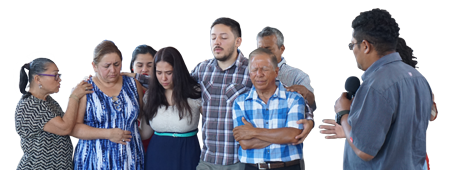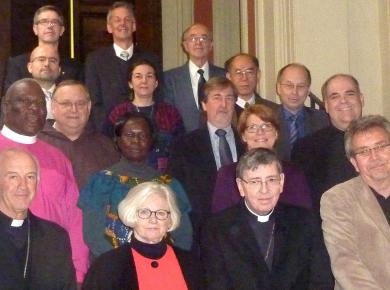Posted: January 14, 2013
First meeting of the Catholic, Lutheran and Mennonite Trilateral Dialogue Commission on baptism
Rome, Italy/Bogota, Colombia – An international trilateral dialogue between Mennonites, Catholics and Lutherans began in Rome, 9-13 December 2012.
According to a joint release issued after the Rome meeting, the overall theme of the five-year process is “Baptism and Incorporation into the Body of Christ, the Church.” The release further stated: “This innovative trilateral forum will allow the dialogue to take up questions surrounding the theology and practice of baptism in the respective communions.”
The three international communions came to the inaugural meeting with a history of bilateral dialogues with each other. They mutually agreed to hold three-way talks on baptism, a topic that had surfaced in earlier exchanges.
Mennonite World Conference (MWC) and the Catholic Pontifical Council for Promoting Christian Unity (PCPCU) held conversations from 1998 to 2003. This resulted in a report entitled “Called Together to be Peacemakers.” Understandings and practices of baptism were among the divergences identified for further study. Mennonites practice adult baptism and Catholics infant baptism, as do Lutherans.
MWC and the Lutheran World Federation (LWF) participated in a joint study commission from 2005 through 2008, which resulted in a final report entitled “Healing of Memories: Reconciling in Christ.” (To see both of the above reports, go to http://mwc-cmm.org/interchurch-dialogue.) During these talks, Mennonites and Lutherans agreed that two areas of difference that existed in the 16th century still exist today, namely the relation of Christians to the socio-political order and baptism.
Further, the PCPCU and the LWF have held 11 rounds of dialogue, with the current round focusing on “Baptism and Growth in Communion.”
The trilateral meeting in Rome, with five representatives from each communion, included summary presentations on past dialogues on baptism. Fernando Enns of Germany presented for MWC. The meeting also included principal papers on the introduction to the Understanding and Practice of Baptism. Alfred Neufeld of Paraguay and John Rempel of Canada presented for MWC.
Other members of the MWC team included Rebecca Osiro of Kenya and Larry Miller of France. MWC General Secretary César García of Colombia was an observer. Alfred Neufeld chaired the MWC team. Miller served as co-secretary along with Gregory J. Fairbanks of the Catholic and Kaisamari Hintikka of the Lutheran team.
According to the joint release, the group will convene for its second round of conversations in January 2014 to study “Baptism: God’s Grace in Christ and Human Sin.” Future topics in following years will include “Baptism: Communicating Grace and Faith” and “Living Out Baptism.”
MWC release
Reflections from Mennonite participants in the dialogueAlmost 500 years have passed since that memorable day in Zurich January 1525 when a group of young radical Bible readers and potential reformers broke with the common baptismal tradition of their time and initiated believers or adult rebaptism. They also stopped applying the baptism ritual to their infants. Split and conflict became inevitable and caused much hurt on all sides. At that time both actions – rebaptism and avoiding infant baptism – were serious offences to European imperial law. Changing the mode of baptism had far reaching consequences not only in the political sense, but also with new approaches to salvation, the nature of the church, Christian ethics, and missions. Today much has changed. In most countries state churches don’t exist anymore. The importance and possibility of personal choices as well as religious liberty is generally assumed. And all three church communions face the question today how to re-evangelize society, and be a prophetic and pastoral presence in the world. By Alfred Neufeld, chair of the MWC team for the trilateral dialogue “It has been very encouraging to see the diversity within each denominational team. We usually assume that there is one single interpretation of baptism in the other traditions. That does not seem to be the case. If we are able to create a mood of trust, we will also be able to share the questions and challenges within our own communities on this key difference of baptism. That is my hope.” By Fernando Enns |





Join the Conversation on Social Media
FacebookTwitterInstagramFlickrYouTube